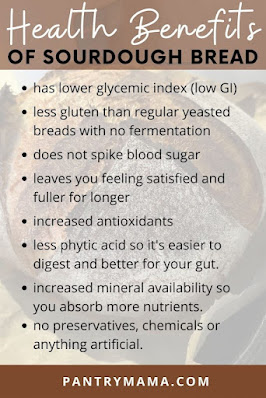Sour dough bread, healthy or unhealthy?
Who doesn’t enjoy some sour dough bread? In California we had some great sour dough bread. This past June, we were on a Viking cruise and many countries had some delicious sour dough bread. Healthy bread is usually whole grain. There are some whole grain sour dough breads but mostly sour dough is made from white flour. Whether made from white flour or whole wheat flour, are there any health benefits to enjoying some delicious sour dough bread?
Why is it called sour dough bread?
Instead of relying on baker’s yeast to raise the dough, sour dough bread uses a “starter” of a living microbes plus flour and water. This is called “wild” yeast which contains some lactic acid that gives sourdough its tangy taste. Sour dough doesn’t use the commercial baker’s yeast used to make regular bread. This is certainly not a new technique for bread making as it dates back to 1500 BC in ancient Egypt.
What nutrients are in sourdough bread?
Sourdough bread nutrition depends on the flour used. Sourdough made with white flour would have less fiber and fewer nutrients than sourdough made with whole grain flour. The nutrition of white sourdough pretty much matches that of white bread providing some protein, carbs, and 1 gram of fiber. There is usually no added sugar and no saturated fat. You also get some B vitamins, iron, calcium, and potassium. However, and interesting fact is because of the lactic acid in sour dough bread, many nutrients are more easily absorbed.
What are some health benefits of eating sourdough bread?
- Gut health – the fermentation that helps make sourdough bread starts to break down some of the proteins in bread including gluten. Those who are sensitive to gluten may find sourdough bread easier to digest. But this bread is not gluten free so should be avoided for those with celiac disease or severe gluten allergies. Both whole grain and white sourdough bread provide fiber which is considered a prebiotic or food for the good bacteria in your gut. Whole grain sour dough would have more fiber.
- Immunity – A study in 2019 found that in the Mediterranean area, elderly eating whole grain sourdough bread had a lower risk for many diseases including “heart disease, cancer and diabetes”.
- Lower Blood sugar – sourdough bread has a lower glycemic index meaning blood sugar spikes are lower and slower. This is especially true for whole grain sourdough bread. “This means that your insulin levels will not spike as high after eating a slice of sourdough bread as they would after eating white bread”.
- Heart – the fiber, potassium, and phosphorus in sourdough bread supports good heart health and the bread has no saturated fat.
- No preservatives – Consumer Reports notes that “Most packaged breads contain preservatives, but true sourdough naturally had a longer shelf life. That is due in large part to the acids acting as antifungal agents...” But read the ingredient label as some manufacturers add preservatives like calcium propionate.
Are there probiotics, gut friendly bacteria, in sourdough bread?
No. Sourdough provides some fiber to “feed” the friendly bacteria in your gut. But the probiotics in sourdough bread are killed during baking. To get more gut friendly bacteria you need to eat foods like yogurt or kimchi. (See: Is Greek yogurt good for you? )
Does sourdough have carbs?
All bread provides carbs but sourdough bread would go into the “healthy carbs” group. Why? Sourdough provides nutrients, some fiber, and may improve digestion, lower risk of some chronic diseases, and often has no preservatives.
How do you know if it is really sourdough?
Unfortunately, some manufacturers want to take short cuts and don’t want to bother with fermentation. Instead, they add vinegar for the sour flavor and use yeast to leaven the bread. This bread would not have the health benefits of sourdough bread made the slow-leavened way. For real sourdough bread the ingredient list will have a “sourdough culture or starter and no yeast”. Also, true sourdough bread will not have preservatives.
Conclusion: When you are out shopping this week, look for some sourdough bread to try. See if you can find some whole grain sourdough bread. Those who are adventurous cooks may want to bake their own sourdough bread. Bread By Elise walks you through making some Rustic Whole Grain Sourdough Bread.
Sources: starter , lactic acid , 1500 BC in ancient Egypt , fermentation , not gluten free , study in 2019 , blood sugar spike , notes , calcium propionate, Is Greek yogurt good for you? , ingredient list , Bread By Elise Image sources: Health benefits of sourdough bread , Health benefits listed , sourdough bread






Comments
Post a Comment